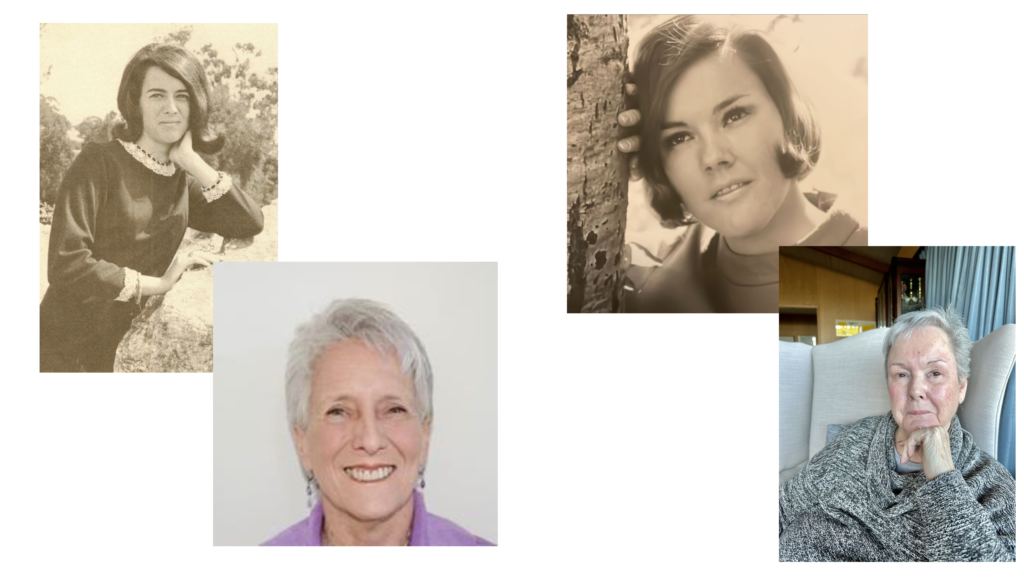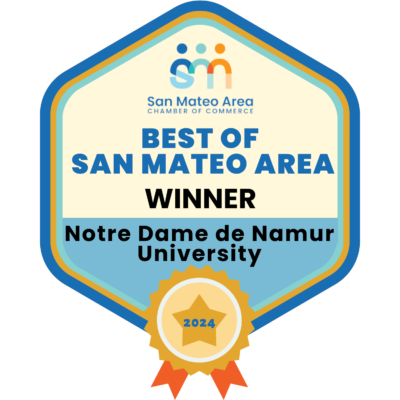In Conversation with Mary Ellen Horwath and Kris Zavoli, Class of 1968

We recently sat down with Mary Ellen Horwath and Kris Zavoli to talk about their experiences at Notre Dame de Namur University, then-College of Notre Dame (CND). As members of the last all-women graduating class, they share their stories and reflect on their own journeys during a time of great global and societal change. We hope you enjoy their recollections as much as we did.
Please share with us a little bit about your background.
Mary Ellen: I’m an only child, born to traditional Democrat-leaning, Irish-Catholic parents in Boston. I grew up the typical baby boomer; my father was in the service during World War II, he worked at IBM. He was stationed out West during the war, and saw the future as being out there, so after the war, our family relocated to southern California. It was a great place to grow up. After college, I couldn’t leave this area. There’s just so much to offer here. I worked for Stanford in Fundraising and Events for over 20 years. Now, I’m retired, but I still teach one class at Stanford, English as a Second Language, and I get a great deal of joy out of that.
Kris: I’m the second oldest of seven children, and my father was a Sergeant in the Air Force which meant that my family moved around a great deal. I attended 10 different elementary schools growing up. You either loved it or you hated it. For me, I enjoyed it very much. I loved traveling around, meeting new people, and seeing different places. It was truly wonderful to explore the world. When I thought about my future, I realized most women became teachers, nurses or secretaries. I didn’t like hospitals so I chose “teacher.” Thankfully I learned to type in high school and helped pay for college working as a Kelly Girl! I’ve supported the educational system for decades. Most notably, I worked for the College Board for 28 years, implementing AP courses in low-income areas. Like Mary Ellen, I’m also retired, AND I teach a weekly English as a Second Language class for adult learners. Diversity and accessibility have always been priorities in my life and I’m happy that I’m still able to work with a wide range of individuals.
What was it about the NDNU (then-CND) that attracted you as a student? Why did you choose it over the other universities/colleges in the area?
Mary Ellen: I spent my whole young life in southern California. My parents strongly encouraged me to leave the area and expand my horizons. Having previously spent time in the Bay Area, my parents and I thought it was a good choice for college. I applied to all the Catholic schools in the area: Santa Clara, USF, Holy Names, and of course, CND. Interestingly enough, my family has long ties to the Sisters of Notre Dame de Namur (SNDdeN). In fact, one of my family members went to Emmanuel College in Boston, which was an all-girls Catholic university run by the SNDdeN. I chose CND, in part because I was nervous to attend school with men, but also because of my familial connection with the Sisters. It didn’t hurt that I was also awarded scholarship money and had opportunities for work-study at CND.
Kris: This is an easy one for me! I was attending an all-girls Catholic high school in Sacramento when I met Sr. Helen Ceclia, a SNDdeN. She urged me, and many of the other girls, to attend college. One day, Sr. Helen Cecelia drove a bunch of us over to CND, walked us straight into the Admissions Department and helped us fill out all the forms. She even explained the whole financial aid process to us. CND was the only place I applied to. I fell in love with the campus – its beauty and the close-knit community. Luckily, I was able to secure a full scholarship, and thanks to my father, even more grant money for boarding and books from the Air Force. I also had a work-study position at CND that helped cover the rest of my expenses.
What was student-life like when you were classmates in the mid-60s? What are some of your favorite memories?
Mary Ellen: It was definitely a different point in time. We had a strict dress code then – skirts and dresses for classes, with nylons and heels. If you wore pants, you could only wear them on the weekends to go off-campus, and you had to cover them with a trench coat. On Sundays, we trooped over to the Chapel for mass decked out in heels, hats and gloves. I have wonderful memories of formal dances at Ralston Hall, introducing our dates to the nuns who formed a receiving line at the top of the stairwell.
By 1967, the Vietnam War had escalated, and as the song goes, the times were a-changin’. Sr. Evelyn Jegen, SNDdeN joined us that year as a visiting Sister from Ohio and shook up the campus with her inquisitive and forward-thinking views. I was her research assistant as she was pursuing a Ph.D., and we took many trips to the Stanford library together. One of her accomplishments was creating an interdisciplinary group of faculty, Sisters and students to discuss books and current events, which I greatly enjoyed.
Kris: I loved my time at CND/NDNU. The richest part of the experience was getting to know my classmates; there were women from 27 states and 30 countries, and we all took a real interest in one another’s lives. One of the highlights was being elected student body president in 1967. Thanks to the exceptional elected student council members, we all learned how to work as an effective team.
I also loved the dances with men from neighboring schools and became a real pro at beating the college’s midnight curfew! I often went to the smoker to play bridge and met the most interesting people there. However, my favorite memory was going to watch plays put on by the magnificent Fine Arts Department. I never missed a play and volunteered to help “put on the show!”
Were there any particular classes or professors that really influenced you?
Mary Ellen: Sr. Joan Marie and Sr. Evelyn Jegen were two Sisters who really inspired me. Sr. Joan, then head of the History Department, changed my life by impressing upon us the mindset that women could think, compete and express their opinions.
The highlight of my four years, and one that left a lasting impression on me, was when Sr. Evelyn encouraged the administration to close campus for a day-long discussion on the Vietnam War. They invited many notable people including former military, current government officials from San Mateo, and Dr. Robert McAfee Brown, a civil rights leader and then-teacher at Stanford. We discussed, confronted and shared opinions. By giving us space to openly examine this controversial topic, the administration showed they were willing to go the distance and put themselves on the line.
Kris: Shirley Morrison and Mary Ellen Boyling, both English teachers, were my favorite instructors. Shirley’s ability to draw students out without lecturing was outstanding. She used a discussion format which truly gave us agency to dive deep into topics and books. Ms. Boyling introduced me to poetry and the beauty of writing and working with the magnificent Mr. Bob Titlow in the drama department taught me to love plays.
In those days, students were required to take 12 units of theology and another 12 units of philosophy which I absolutely loved. One of the classes that made a lasting impression on me was The Religious Experience of Man, which explored atheism, among other theologies. We were really encouraged to think and question.
What are some ways that CND/NDNU prepared you for life?
Mary Ellen: Overall, I have to say that we were encouraged to explore and question throughout our years at CND, and my eyes were opened to the world. There was such a special sense of togetherness and commonality since we were the daughters of parents who lived through the Depression and whose fathers were World War II veterans.
A very memorable and equally important experience was learning how to comport oneself in private and public settings, a skill that has served me well in working with major donors at Stanford. The Sisters taught us how to set a formal table, how to entertain and how to present ourselves as Notre Dame women. Thanks to my days at CND, I am equally comfortable speaking to people from all walks of life, including dignitaries and former Presidents.
Kris: Being student body president at that particular time of great cultural and geo-political change was pivotal. I developed leadership skills and got to know a lot of student leaders from different colleges in California, many of whom had diverse and divergent views of the war in Vietnam. These early experiences helped shape my priorities of promoting diversity and accessibility.
Aside from that, I have had many opportunities to use my major in French, especially in connecting with my family’s history. In 2008, a researcher called me out of the blue and asked if my father was shot down in 1943 in France. I was shocked, but I thought, I better listen to what he has to say. One thing led to another, and there I was, a few months later, at the annual reunion for airmen shot down in World War II, surrounded by former escapees and those that helped them evade the Germans. It was truly an amazing experience to be a part of such a special group and to meet people that aided my father on his journey to safety.
How have you stayed engaged with NDNU?
Mary Ellen: Kris and I have both remained very close with our Class of ‘68. In fact, we just celebrated our 55th reunion. We did a zoom online and, for the dozen or so that live around here, we gathered in-person for a wonderful luncheon. It’s truly amazing to see what these special women have done throughout their lives.
In the past, I’ve assisted NDNU with strategic planning and sharing best practices with the University’s Advancement team. Currently, I’m pleased to be on the Alumni Advisory Council with my dear friend, Kris, and several other alums. We gather quarterly to discuss future ideas and events that promote alumni engagement.
Kris: After graduation, Bob Titlow, then Director of Admissions, hired me to recruit students for CND. The greatest benefit was free tuition for my credential in elementary and secondary school and Master’s of Teaching English. I liked being in Admissions a great deal. I could recruit students the same way Sr. Helen Cecelia did. I went on to become the Director of Admissions and stayed for 15 years.
Over the years, I have supported NDNU with donations, and in 2004 I funded an endowed scholarship for first generation students which has now been transferred to graduate programs. In more recent times, I’ve served on the Board of Trustees and been named Trustee Emerita. I still attend Board meetings to keep up to date with recent happenings. As Mary Ellen mentioned, we’re also invested in re-engaging alumni and community members. While a lot has changed since Mary Ellen and I attended, I’m excited about the future and grateful to be a part of the process.

